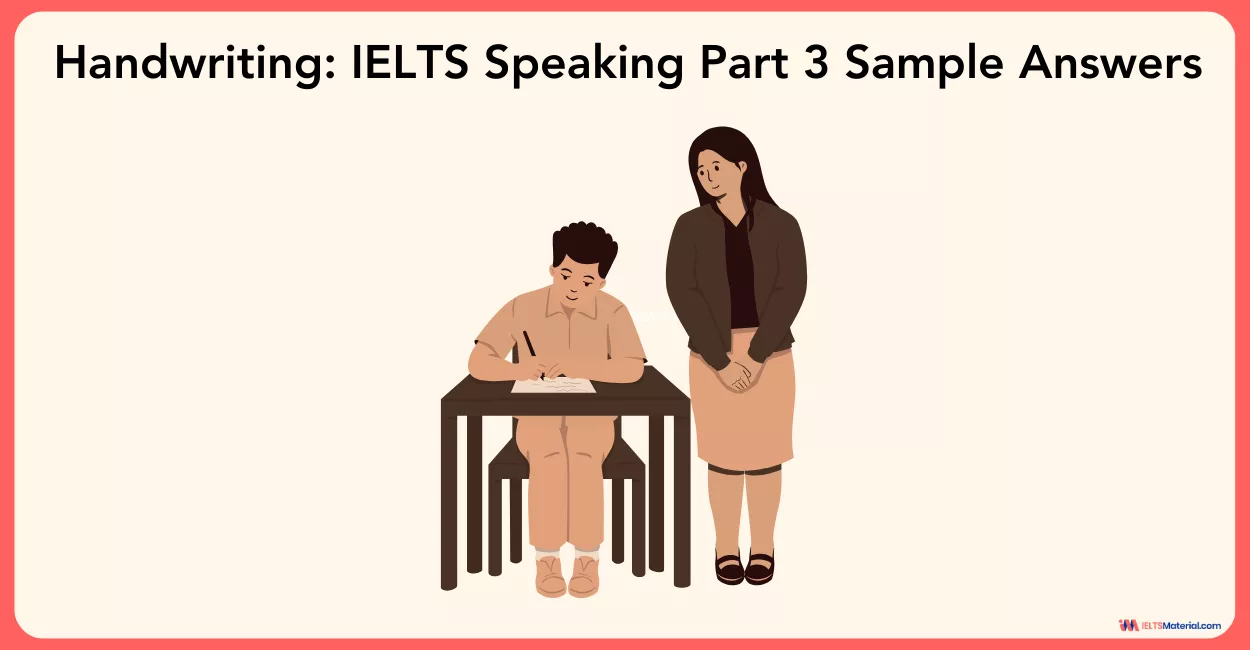IELTS Speaking Part 3: Question Types, Assessment Criteria, Tips to Boost Score
-
Copy link

Limited-Time Offer : Access a FREE 10-Day IELTS Study Plan!
“Read this expert-curated article on IELTS Speaking Part 3: Question Types, Assessment Criteria, Tips to Boost Score explaining the common question types, techniques to solve them, and much more for an easy band 8+ “
What is IELTS Speaking Part 3?
In the IELTS Speaking Part 3 also called a counter or follow-up questions on IELTS Speaking Part 2, the examiner will ask a broader range of questions from the topic given in Part 2. The test taker, therefore, has to elaborate and go in-depth on the topic to answer these part 3 questions. Let’s now learn all about IELTS Speaking Part 3 from its question types and expert strategies to crack it to all the latest topics that are asked so far for you to practice!
How Exactly Does an IELTS Speaking Part 3 Look Like?
Look at the following example picked from a recent IELTS Speaking question paper for your understanding!
Speaking Part 2 - Cue Card
- What is it made of?
- Where and when did you eat it first?
- Why do you like it?
- Do you know how to make it?
*Therefore, after the Speaking Part 2 card, these questions will be asked in Speaking Part 3!
Speaking Part 3 - Follow-up Questions
- Do you think diet is important?
- What is a balanced diet?
- Do people eat in restaurants in your country?
- What is the typical diet of people in your country?
- Why do some people enjoy eating out?
7 IELTS Speaking Part 3 Question Types
These IELTS Part 3 Speaking questions usually require you to express opinions, provide explanations, and discuss issues in depth. Here are the latest common 7 types of questions you might come across in this part:
1. Opinion Questions:
Example: "Do you think it’s important for people to learn foreign languages?"
Purpose: To evaluate your ability to articulate and support your opinions.
2. Comparative Questions:
Example: "How do you think people's lifestyles have changed over the last 50 years?"
Purpose: To see how well you can compare different ideas, periods, or trends.
3. Hypothetical Questions:
Example: "What might be the impact on society if everyone worked from home?"
Purpose: To test your ability to speculate about potential outcomes.
4. Problem-Solution Questions:
Example: "What can be done to reduce the level of pollution in cities?"
Purpose: To see how you identify problems and propose solutions.
5. Prediction Questions:
Example: "How do you think technology will change the way we work in the future?"
Purpose: To evaluate your ability to discuss future trends and possibilities.
6. Impact Questions:
Example: "What impact has globalization had on local cultures?"
Purpose: To assess how well you can discuss the effects of various phenomena.
7. Advantages and Disadvantages Questions:
Example: "What are the advantages and disadvantages of living in a big city?"
Purpose: To understand your ability to analyze and weigh different sides of an issue.
Grab the IELTS Speaking: Channeling the voice in 30 days today and take a step towards achieving a band 8+!
Assessment Criteria of IELTS Speaking Part 3
The speaking assessment criteria are 4 for the IELTS Speaking Part 3 and are the same as the other two parts! The four criteria include:
- Fluency and Coherence
- Lexical Resource
- Grammatical Range and Accuracy
- Pronunciation
Advanced Techniques for IELTS Speaking Part 3
Following are some of the advanced techniques for IELTS Speaking Part 3:
1. The O.R.E.C. Technique
This technique helps you organise your thoughts and provide a comprehensive IELTS Speaking Part 3 response.
- Opinion: Clearly state your viewpoint.
- Reason: Explain why you hold this opinion.
- Example: Provide specific examples to support your reason.
- Consequence: Discuss the implications or consequences of your opinion.
2. Effective Use of Linking Words
- Use linking words like "furthermore," "however," and "for instance" to connect ideas and enhance coherence.
- Avoid overusing fillers like "um" or "uh," which can disrupt fluency and clarity.
- Go throguh the 7 IELTS Fluency Problems and not memorize the content according to the topics.
3. Natural and Confident Delivery
- Speak naturally without forcing complex vocabulary or formal phrases you are uncomfortable with.
- Maintain a natural pace of speech and familiarize yourself by understanding What is the Correct Tone in IELTS Speaking Test.
- Focus on clear pronunciation, fluency, and maintaining a conversational tone to sound more natural and confident.
Want to ace your IELTS Speaking ? Book a free trial and get expert help!
Tips to Answer Certain Question Types in IELTS Speaking Part 3
Look at the following expert tips to crack the IELTS Speaking Part 3 in no time!
1. Don’t give personal answers.
For example: ‘Do you think dieting is important?’
Incorrect answer: Yes. I am dieting to reduce weight and maintain a healthy lifestyle. I think everybody should go on a diet.
Correct answer: Yes, I think it is. If people are above their normal weight and are unhealthy, they should go on a diet to have a healthy lifestyle.
2. Give opinionated answers.
For example: ‘Why do you think people enjoy eating out?’
Correct answer: ‘I think people prefer a change of place sometimes. They might not be interested in eating inside the four walls of their house like they usually do. Another reason might be that they love to try different cuisines from different restaurants and eating outside with friends and family has also become a major pastime.’
3. Give examples along with your opinion.
For example: Do you think parents should help their children with their homework or should it be done by the children on their own?’
Correct answer: ‘I think the children should do it on their own but they can reach out to their parents for doubts will help them understand their homework as they will explore more and research more to find out the answers! For example, on days that my brother did his homework on his own, he understood better and read more about the topic than when my mom helped him with it.
4. Answering comparison questions
If you’re asked questions that need you to compare the present to the past, you would have to use certain vocabulary.
For example: ‘Are the recreation techniques that are popular today the same as those that were popular when your parents were young?’
Correct answer: ‘No. They aren’t like how they used to be. Years ago, when my parents were young, recreation was based more on outdoor activities than indoor activities. Today, it is mainly cinema, social, media etc. but in the past, it was usually football, basketball or even swimming.’
Boost your speaking skills! Join our IELTS Webinar for expert guidance and advice.
5 Tips on How to Handle Difficult Questions in IELTS Speaking Task 3
Here are 5 Tips on How to Handle Difficult Questions in IELTS Speaking Part 3 and achieve your desired IELTS Band Score:
- Clarify If Needed: Politely ask the examiner to repeat or explain the question if you're unsure.
- Use Structured Responses: Begin with an introduction, state your main points, and conclude to give your answer a clear structure.
- Provide Examples: Use specific examples to illustrate your points and make your answer more persuasive.
- Take a Moment: It's okay to pause briefly to gather your thoughts before responding.
- Stay Relevant: Ensure your answer directly addresses the question and avoids going off on a tangent.
If you want to enhance your speaking skills, check out these 10 Expert IELTS Speaking Tips to Impress the Examiner
Practice IELTS Speaking Part 3 Questions with Answers
Would you like to know the set of follow-up questions that might help you answer the Speaking part 3? Here is the list of possible questions that might be asked for every cue card question. We’ve also included answers to the questions. Below is a list of the most common topics which you might encounter in the exam.
Check Out the 50 IELTS Speaking Part 3 Topics; Questions with Answers and Practice Better!
Band 8 Sample for IELTS Speaking Part 3 Topics
Below is the list of Band 8 Sample for IELTS Speaking Part 3 Topics:
- Topic: beauty
- Topic: buildings
- Topic: information
- Topic: old person
- Topic: Movie/Drama
- Topic: happy marriage
- Topic: Education
- Topic: Weather/Environment
- Topic: Foreign Culture/Society
- Topic: Word and Careers
- Topic:s interesting speech
- Topic: handwriting
- Topic: leadership
- Topic: living separately
- Topic: events celebration
- Topic: a special meal
- Topic: children money
- Topic: employment
- Topic: foreign language
- Topic: holidays
- Topic: law
- Topic: learning
- Topic: party
- Topic: public speaking
- Topic: role models
- Topic: schools
Need more IELTS speaking practice tests? Check out the Comprehensive IELTS Speaking Band 8 Preparation Course (Self paced) to achieve a band 8+.
List of Common IELTS Speaking Topics with Sample Answers
Below are some additional speaking practice tests to help you kick-start your IELTS Speaking preparation:
- 50 Recent IELTS Speaking Topics for Part 2 and 3 for IELTS 2025
- 151 IELTS Multilevel Speaking Part 2 & 3 Topics with Model Answers
- IELTS Speaking Recent Actual Tests with Suggested Answers for IELTS 2025
- 40 IELTS Speaking Part 2 Tips, Questions and Band 9 Sample Answers PDF Download
- Recent IELTS Speaking Topics Part 2 & 3 with Model Answers
In order to score a band 8+ in the IELTS Speaking Section, you can start your journey and prepare towards success.
Frequently Asked Questions
What kind of questions will be asked?
How many questions will be asked?
Do I have to provide examples with the answers?
Is speaking part 3 related to speaking part 2?
Is speaking part 3 more important than 2?
Recent Articles

Kasturika Samanta

Nehasri Ravishenbagam

Nehasri Ravishenbagam



